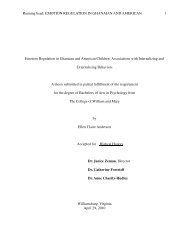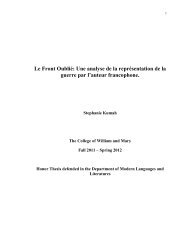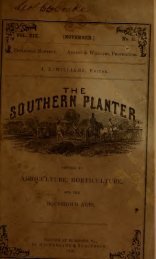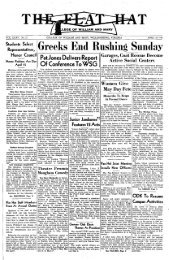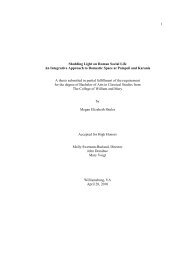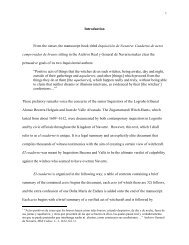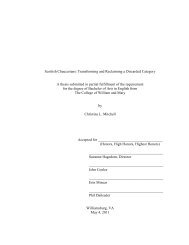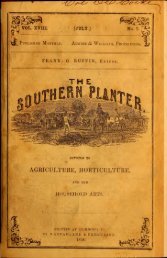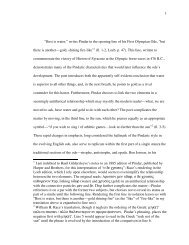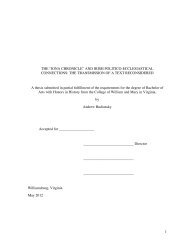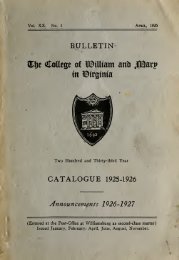Southern planter - The W&M Digital Archive
Southern planter - The W&M Digital Archive
Southern planter - The W&M Digital Archive
You also want an ePaper? Increase the reach of your titles
YUMPU automatically turns print PDFs into web optimized ePapers that Google loves.
1908.] THE SOUTHEKN PLANTER 33<br />
rarely produced over ten to fifteen bushels per acre of<br />
corn; now great improvement is everywhere apparent<br />
and yields of thirty bushels of corn per acre are common<br />
to all the fields, the best going much higher. Forty<br />
acres of this land has increased its fertility to such an<br />
extent as to be successfully planted in alfalfa. Twenty-<br />
five acres are still devoted to this crop, while a small field<br />
occupied for four years, and from which twenty crops of<br />
hay have been harvested, was last year planted in corn<br />
In June and no fertilizer used. Fositive information of<br />
exact yield is not yet to hand, but several of our farmers<br />
predicted seventy-five bushels per acre just before harvest<br />
<strong>The</strong> comparative merits of the two crops—cow peas<br />
and soja beans—are often discussed. It has been clearly<br />
shown that when harvested for hay before developing<br />
seed the results in soil fertility are essentially alike, but<br />
if both are permitted to mature seed it will be found that<br />
the soja bean has carried from the soil a greater quantity<br />
of fertility, because the quantity of seed is greater and<br />
the grain itself is much richer in nitrogen than the grain<br />
of the cow pea.<br />
Experience in 1905 abundantly corroborates the above.<br />
In spring of 1904, two adjoining fields—one of twenty-five<br />
acres, the other of thirty-two acres—were planted simultaneously—the<br />
former in cow peas, the latter in soja<br />
beans—both at the rate of one bushel per acre, put out<br />
with a wheat drill. <strong>The</strong> fields were fairly similar in fer-<br />
tility and received the same preparation. In August, the<br />
peas were made into hay. <strong>The</strong> beans were permitted<br />
to mature their seed and were not harvested until<br />
Both fields made large crops—the yield of beans in<br />
late.<br />
seed<br />
being enormous. , <strong>The</strong>se fields were sown in wheat, after<br />
thorough preparation with disc harrow. At harvest the<br />
field }n cow peas yielded about twenty bushels of wheat<br />
per acre, while the field in beans gave a return of about<br />
ten bushels. At the time of the harvest of the beans a<br />
calculation of the quantity of nitrogen removed by this<br />
large crop of seed justified the prediction that there was<br />
not enough of this element left in the soil to produce a<br />
maximum crop of wheat. <strong>The</strong> final results fulfilled thia<br />
prediction.<br />
Care in the selection and planting of the seed of every<br />
crop grown, the use of all available home-made manure,<br />
aided by every labor-saving implement, coupled with pursuit<br />
of the above rotation, will, it is believed, make every<br />
acre of land not only very productive, but sufficiently<br />
remunerative during the regeneration to give a handsome<br />
living to the farmer.<br />
Fearing that the supply of potash, now so heavily drawn<br />
on by the increased crops, might be getting low, every<br />
few years experiments are made with this ingredient to<br />
test the present available quantity.<br />
So far, no indication of a deficiency has been manifested,<br />
nor do I believe an application of potash manures<br />
will be necessary as long as the crops grown upon the<br />
land are fed to stock and the resulting manure carefully<br />
returned to the fields. WM. C. STUBBS.<br />
Gloucester Co., Va.<br />
THE NEED OF THE SOUTH—INTENSIVE NOT EX-<br />
TENSIVE FARMING.<br />
.Editor <strong>Southern</strong> Planter:<br />
In reading the agricultural journals and bulletins Issued<br />
by the Experiment Stations, it is a very obvious fact that<br />
the most prosperous farmers, and the most successful, are<br />
the class that devote their energies to a very small area<br />
compared to the great plantations that in ante-bellum day*<br />
were the pride and the boast of the South.<br />
(Mr. Editor, please note<br />
gard to the South only).<br />
what I say is spoken In re-<br />
But circumstances have changed completely. <strong>The</strong> Slav*<br />
of yesterday has become the lord (?) of to-day. <strong>The</strong> great<br />
plantations with their quarters and overseers are only a<br />
memory and the intent of the law is that each human<br />
being shall reap the reward of his own labor. <strong>The</strong> <strong>Southern</strong><br />
<strong>planter</strong> in his endeavor to reap the same income aa<br />
that before ithe '60's, rented his fields to untutored labor<br />
with the result of a complete failure to himself and the<br />
tenant. What were once fertile and productive fields were<br />
replaced by broomsage and deep washes, and later on by<br />
the friendly pine. <strong>The</strong> tenant moved to more promising<br />
fields, and the disappointed landlord saw what was once<br />
the pride of his intelligence and the boast of his tongue<br />
pass from his hands to satisfy his creditors, and he him-<br />
self "broke up housekeeping" to live with some of hia<br />
children or grandchildren, or moved to the town from<br />
where, after a few years, he was laid to rest on a stranger's<br />
land.<br />
<strong>The</strong> framework, the skeleton, of the old plantation la<br />
still with us. <strong>The</strong> same sun shines upon us, the same<br />
seasons assist our efforts, and the same God listens to<br />
our prayers.<br />
We read every day accounts of how some energetic,<br />
intelligent person has produced five times the amount per<br />
acre upon a small farm through intensive farming and<br />
improved methods, that could have been produced through<br />
the old plan. <strong>The</strong> salvation of our South is in the small<br />
farm with Intensive methods applied. <strong>The</strong> Northern<br />
States with their small farms and intensive cultivation<br />
and the disadvantage of long and cold seasons, outrival us<br />
in the money value of their productions per acre. With<br />
educated minds and improved machinery they laugh us<br />
to scorn, notwithstanding our soils are more fertile and<br />
our winters milder.<br />
We are pleased<br />
way and scold at<br />
to continue in the same unprofitable<br />
intelligent advice, while we sacrifice<br />
our labors to ithe customs of tradition. Of course, some one<br />
will wisely ask, "Wherein is our safety?" Turn your faces<br />
toward the North, and there in eternal letters read the<br />
answer from Maine to Maryland, and from the Great<br />
Lakes southwest toward the Pacific Ocean. Learn from<br />
that country where it is not considered a disgrace to one'i<br />
character and a lowering of one's diginty to labor upon<br />
the farm. Our South is inoculated with too great an<br />
abundance of that false pride which will not permit one<br />
to honestly earn his bread following the plow; we must<br />
bury forever our unworthy prejudices against a worthy<br />
immigrant, it matters not whether he hall from Conti-<br />
nental Europe, or from a distant part of our own Union.<br />
And right here I wish to say that I sincerely believe that<br />
the Northern and Western farmer who has come among<br />
us and made our country his country, is the salt to the<br />
whole system. <strong>The</strong>y do not agitate nor do they advocate,<br />
but their examples of untiring labor are gradually working<br />
a revolution over the entire country. We need more<br />
of these living examples, and the finished products of tha




